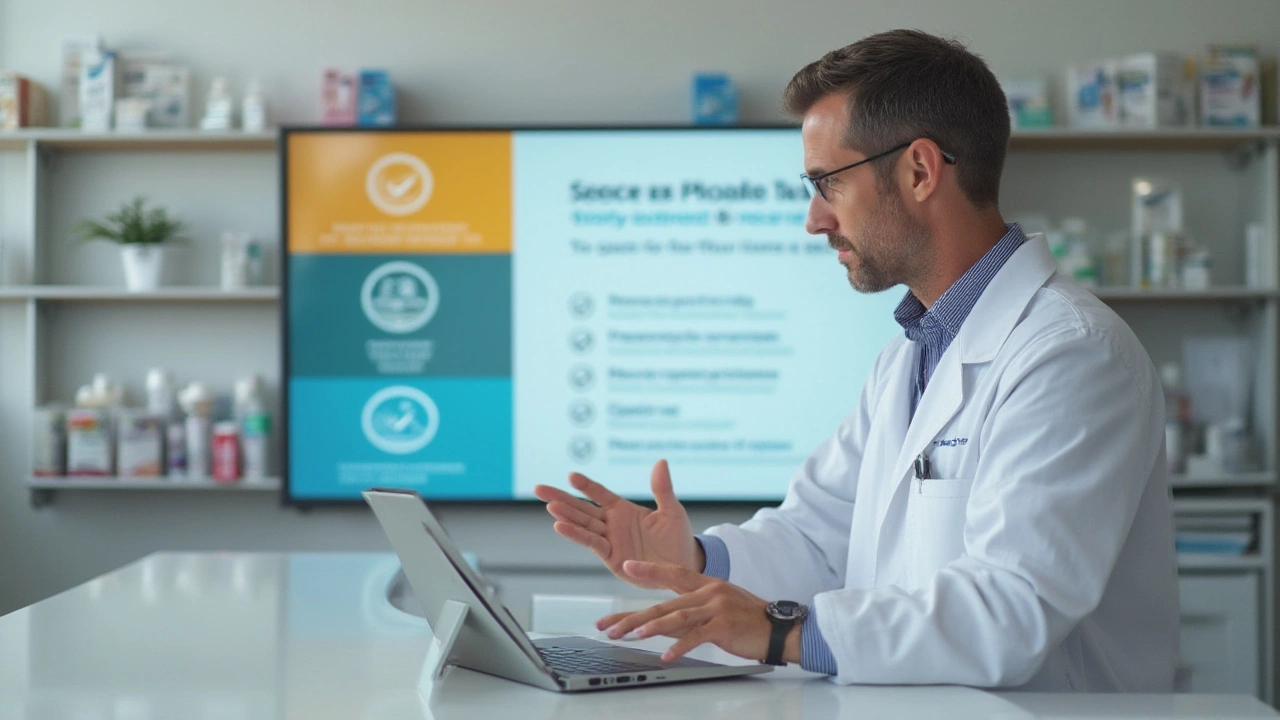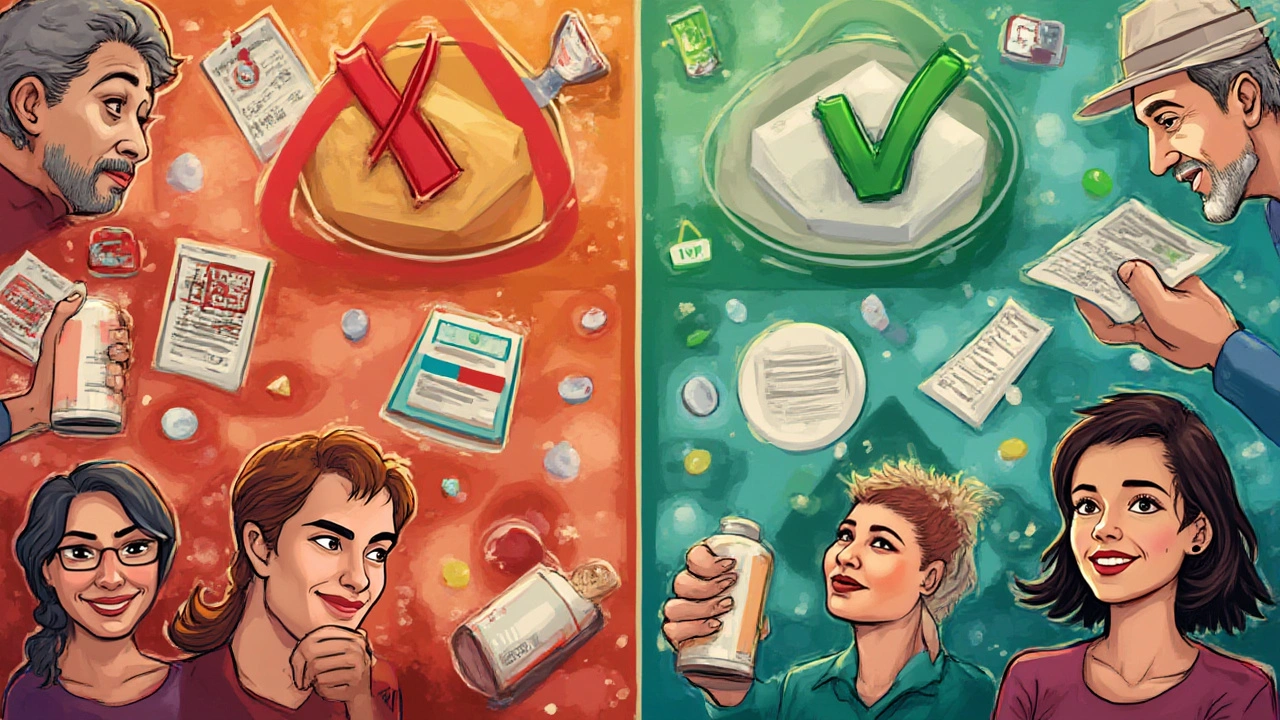You’re probably not the only one who’s wondered if there’s a legit way to get buy penicillin online without slogging through endless queues at the doctor’s office. Maybe your local pharmacy is out of stock, or you’re simply tired of dealing with the vague answers that usually end with 'try again next week.' With the digital wave turning everything from groceries to prescription meds into a few clicks, the world of antibiotics has changed, too. But, wait—just because you can order penicillin with a smartphone and a Wi-Fi signal doesn’t mean you should do it blindly. There are big risks, hidden gems, and more fakes out there than you’d expect. Let’s get honest about what’s real, what’s risky, and how you can stay safe if you need penicillin online.
Why Would You Want to Buy Penicillin Online?
Picture this: a sinus infection hits you just hours before your flight, your child’s ear pain spikes on a Sunday night, or maybe you’re stuck somewhere remote like the Karoo, far from any pharmacy. Penicillin is what you need—fast. Buying antibiotics online can seem like a lifesaver in moments like these. It’s quick, private, and sometimes surprisingly affordable. But it’s more than just convenience; for many rural South Africans or those living without easy access to clinics, this option feels like the only way to go. The demand for online medicine sales in South Africa jumped about 75% during the pandemic, with antibiotics among the top searches. This surge came with scams, counterfeit pills, and unscrupulous sellers, of course, but also a wave of well-run digital pharmacies that follow all the rules. The trick is telling them apart.
Another less obvious reason for turning online is the stigma some still feel around discussing infections, especially when it comes to intimate health issues. People hope for privacy, which online orders promise. But here’s the hard truth: it’s not as simple as ordering shoes or groceries. Laws differ wildly from country to country, and prescription medications are carefully controlled in South Africa and much of the world. While you can buy vitamins just about anywhere, antibiotics like penicillin usually require a doctor’s sign-off. Some international pharmacies claim to ship globally and 'bypass' your local regulations, but that opens a can of legal and health-related worms you really don’t want.
So, should you do it? The answer depends on a few things: how urgently you need penicillin, whether you have a valid prescription, and how much risk you’re willing to accept. You need clear eyes, lots of caution, and the confidence to walk away from a deal that sounds too good—or too fast—to be true.
The Legal Side: Prescription Rules and Red Flags
It’s tempting to type ‘buy penicillin online South Africa no prescription’ into Google and hope for a fast fix. Not so fast. South African law, much like most countries’, says antibiotics like penicillin are not over-the-counter meds—you need a registered doctor’s prescription. The law exists for a reason: misuse and overuse of antibiotics breeds superbugs, making common infections dangerous again. The World Health Organization lists South Africa as a hot spot for antibiotic resistance, and black-market sales online only make this worse.
If you come across a website promising to deliver penicillin to your door, no questions asked, you should take that as a red flag. In fact, the Health Professions Council of South Africa (HPCSA) regularly warns against buying prescription medication from unregistered websites. The legal and health risks are real: you could get fake pills, outdated batches, or even be scammed out of your money. Worse still, you’re putting your health on the line in ways you can’t control.
Legit online pharmacies will always require a valid prescription. Some may help you get one by linking you to a registered doctor for an online consult—a model that’s booming now thanks to telemedicine. Check the website for real credentials: is it registered with the South African Pharmacy Council? Can you find a real pharmacist's name and HPCSA registration number? These aren’t just details for show; if something goes wrong, you need someone who’s accountable.
Outside of South Africa, regulations change. Some Americans can get penicillin through their telehealth provider, with an e-script sent directly to an online pharmacy. In the UK, the National Health Service may ship certain meds after an online consultation. Some offshore websites sidestep these checks, but ordering from abroad often means your medicine gets stuck at customs—or worse, seized and destroyed.
| Country | Can You Buy Penicillin Online? | Prescription Required? | Biggest Risk |
|---|---|---|---|
| South Africa | Only from registered online pharmacies | Always | Counterfeit pills, legal penalties |
| USA | Yes, with reputable telehealth or pharmacy site | Always | Mail fraud, fake pharmacies |
| UK | Yes, via NHS or private service | Always | Uneven regulations with offshore sites |
| India | Often, but poorly regulated | Technically yes, but not always enforced | Quality, authenticity issues |

How to Spot a Trustworthy Online Pharmacy
Shopping for antibiotics isn’t the same as picking out a new shirt. If you’re looking for a reputable online pharmacy, you need to dig a little. First, check if the website lists a physical address within South Africa and a license or registration number with the relevant health authority. Reputable online pharmacies—think Clicks, Dis-Chem, and Medirite in South Africa—are upfront about this info and will insist on a prescription before they fill your order.
Avoid any website offering penicillin for sale without a script, or those promising miracle cures. Real pharmacies don’t market penicillin as an all-purpose 'infection killer.' Genuine providers also make sure you know about side effects, potential allergies, and proper dosing. They’ll ask about your medical history before handing out antibiotics like smarties.
Look for SSL certificates (that reassuring padlock icon beside their web address) and payment methods that offer buyer protection. If a site only accepts bank transfers or crypto, run the other way. Stick to credit card payments or legit payment gateways like PayPal or SnapScan—these offer some recourse if things go wrong.
Customer reviews are a goldmine. Check independent forums, Reddit threads, or reputable health review sites to see what actual users are saying. If something feels off, it probably is. And don’t be fooled by professional-looking design alone; even the most convincing site can front for scammers. When in doubt, call their customer support line and see if you get to talk to a real person or just an endless voicemail.
- Check for a registered pharmacist’s name and number
- Make sure a physical address and license are listed (not just a PO box)
- Payment through reliable, protected gateways only
- Never buy from a site that skips the prescription requirement
- Be wary of overnight, 'risk-free' shipping promises
Getting a Prescription: Online Consultations Explained
You thought getting a doctor’s note meant waiting for hours at a clinic, right? Not anymore. Telemedicine exploded in South Africa after 2020—life in a lockdown pushed everyone to try video calls and digital scripts. Today, sites like Hello Doctor, Mediclinic, Telehealth Africa, and even some private GPs offer online consults for anything from tonsillitis to urinary tract infections. If your symptoms call for penicillin, your doctor can send an electronic script directly to your pharmacy or email it to you. No more chasing paper.
This is the safest way to access penicillin if you can’t get to a doctor in person. The process is surprisingly simple: you book an online slot, talk to a doctor or nurse, describe your symptoms, and sometimes show photos of any visible signs (rash, swelling, etc.). If you’re prescribed penicillin, you get an email or SMS with the script attached—ready to send to your pharmacy. Legitimate online and in-person pharmacies like Clicks and Dis-Chem accept these e-scripts, and will even have a pharmacist call you to confirm details before dispatching your meds. Fast, secure, and still within the law.
Telehealth consults don’t always cost a fortune, either. On average, a ten-minute session ranges from R200 to R450—less than the price of some specialist clinics. Discovery, Momentum, and other major medical aids now cover many of these visits. Some platforms even have after-hours or weekend appointments, so you’re not forced to wait out a painful infection until Monday.
- Confirm the telehealth provider is listed with the HPCSA
- Describe your symptoms as accurately as possible—don’t downplay allergies or underlying conditions
- Ask for digital copies of your prescription in PDF or another common format
- Save all correspondence—helpful for follow-up or if there’s an issue with your order
One warning, though: online scripts have a digital footprint. Abuse of repeat antibiotics prescriptions can raise red flags, putting you on blunt-force pharmacy watch lists. Stick to what you need and never share scripts.

Cost, Delivery, and What to Expect Post-Purchase
The days of penicillin costing next to nothing are long gone, but buying online can still save you money—sometimes. Prices vary based on brand, strength, and whether you’re buying generic (phenoxymethylpenicillin is the classic). In Cape Town, a standard 10-day course can range from R50 to R140 at legitimate online pharmacies, plus delivery fees. Some local services offer express delivery in the big metros, and you might even get same-day drop-off if you order before 1pm. Out in the sticks? PostNet and courier delivery options mean even rural addresses are covered, but expect an extra two to four days in transit.
Shipping meds isn’t as simple as dropping a box in the mail. Good pharmacies use temperature-controlled packaging for sensitive drugs, and a tracked delivery system so you always know where your meds are. They’ll often require a signature so your medicine doesn’t end up in the wrong hands. Watch out for customs delays with international sites, and remember—if you get caught importing prescription meds without the proper paperwork, they could be seized at the border. That’s both money and time lost, often with no refund.
Once your package arrives, inspect the box closely. Are there tamper-proof seals? Is the expiry date readable and at least 6 months away? Is the leaflet in English (or your preferred language) and does it list a South African registration code? Anything less, and you should call the pharmacy straight away for clarification. Never take a pill if you have any doubts about what’s inside.
- Always buy the full prescribed course—cutting antibiotics short can lead to resistance
- Double-check the dose and instructions with the pharmacist when your order arrives
- Store penicillin in a cool, dry place as per the package instructions
- If symptoms worsen or you have a bad reaction, contact your doctor immediately
And remember—there’s no harm in checking in with your pharmacist for advice, even after buying online. Most major chains have 24-hour health helplines to answer quick questions.

Comments (7)